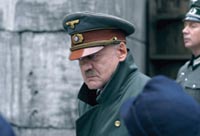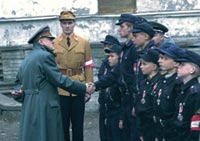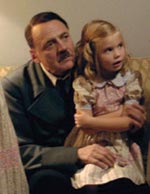 |
Movies have taught us to see the world as a contest between heroes and villains. We like our good guys good, and our bad guys bad. So when filmmakers talk about making a movie that explores the humanity of someone like Adolf Hitler, people get nervous. Even if we suppose that Hitler, for all his crimes, was not quite the worst dictator in the world—he lasted only a dozen years, and the innocents who died under his regime may be outnumbered by the victims of, say, Stalin and Mao—we still want him to be the embodiment of pure evil. So we worry that making him more human will make him more sympathetic, and that sympathy for the man will create sympathy for his toxic ideas.
But in the case of Downfall, at least, nothing could be further from the truth. Several films about Hitler have been made in the English language, starring the likes of Alec Guinness and Anthony Hopkins, but Downfall is the first in decades to be made in Germany itself. And it is precisely because Hitler and his associates are shown in all their emotional complexity that we realize just how monstrous and dehumanizing their thoughts and deeds were.
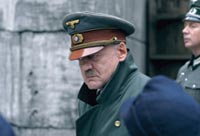
The film is written by Bernd Eichinger, an occasional screenwriter who has had much more experience as a producer on everything from The Name of the Rose to the Resident Evil flicks (we won’t hold those latter examples against him), and it is directed by Oliver Hirschbiegel, whose last film to cross the Atlantic, Das Experiment, was a positively visceral fictionalization of the Stanford prison experiments. Evidently Hirschbiegel thrives on claustrophobic environments, in which the shaky semblance of order threatens to erupt into sheer anarchy; most of Downfall takes place in bunkers in Berlin, and while Russian artillery pounds the city, Hitler wavers between dreams of fighting back and a sad acceptance of his fate, with occasional bouts of furious yelling at the officers he feels have betrayed him.
Hitler is played by Bruno Ganz, recently seen in the remake of The Manchurian Candidate but may be best known as one of the angels in Wings of Desire. Despite his ravings about the evils of compassion, Ganz’s Fuhrer is capable of moments of softness and tenderness, especially where his mistress, Eva Braun (Nowhere in Africa‘s Juliane Köhler), and his secretary, Traudl Junge (The Tunnel‘s Alexandra Maria Lara), are concerned. He is also capable of extreme callousness, even toward his fellow Germans as a whole. Despite all his rhetoric about the Fatherland, Hitler has little use for its sons and daughters; he proclaims that they deserve to suffer because they have proved to be too weak.
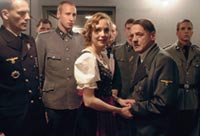
Thus, he makes no effort to evacuate the city. And thus, those soldiers and civilians who are exposed to the assault aboveground run about shooting and lynching each other, engaging in various forms of debauchery, or arguing over whether there is any point in fighting back. As seen here, Nazi Germany is more than a totalitarian state; it is a personality cult and a religion devoted to a nationalist idea, and now that that idea is dying and the person at the heart of it is losing his grip—both metaphorically and literally, as evidenced by the shaking hand, a possible sign of Parkinson’s disease, that Hitler keeps hidden behind his back—those who once believed in his vision act like the apocalypse itself has arrived.
More than once, we hear someone say that a future without National Socialism is no future at all, and given that the city around them looks like hell on earth already, we can understand why so many of them kill themselves and their families. But after a while, the parade of suicides—and there are a lot of them, from the grenades set off under a dinner table to the various bullets through the brains—does begin to wear on the viewer.
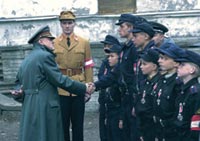
The film has its ironies. While Hitler’s officers burn documents outside the bunker, and while underaged troops engage in suicide pacts, Eva Braun writes a letter to her sister, fussing over such banal details as her unpaid bills and the fate of her jewelry. A breakdown in communications causes General Weidling (Michael Mendl), who has been fighting barely a kilometer from the front line, to be sentenced to death for alleged cowardice, but when he explains himself to Der Fuhrer, his sentence is overturned and he is put in command of all Berlin’s defenses. (“I’d rather have been shot than have this honor,” he sighs.) And then there is Hitler himself, who, in his frailty and his delusion that he can still beat the Allies, has become the very sort of weakling divorced from reality that he despises.
Watching Downfall is, curiously, a little like watching The Passion of The Christ—we enter the theatre knowing the basic story, and the film takes us through all the familiar plot twists (visits before Caiaphas and Pilate over here, the suicides of Hitler and Goebbels over there) while testing our endurance with its supposedly accurate, non-stop violence. The obvious difference, of course, is that one film is about the Son of God, and ends on a note of resurrection, whereas the other is about one of the worst governments ever known, and for the Germans, there is no clear hope in sight, even when Nazism ends; for many, the end of the war will mean not liberation, but another form of totalitarianism under the Soviets.
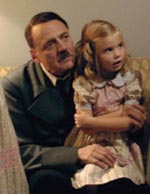
But that sort of context is never made explicit in the film; like The Passion, Downfall expects the viewer to bring his or her own contextualization to the theatre, and it focuses so exclusively on the protagonist’s death that you almost wish the film had offered some sense of what it was about his life that had brought things to this point. It could have been interesting, for example, to contrast the way Hitler spends his last days cowering underground with the open-air rallies he held earlier in his life, when he lectured with fiery confidence before an admiring audience of thousands, or to see what sort of relationships Hitler had had with his generals before all the betrayals and disappointments set in.
Curiously, the film also undermines its own dramatization of Hitler’s last days by beginning and ending with clips from the documentary Blind Spot: Hitler’s Secretary, in which the real-life Traudl Junge reflected on her role in these events shortly before her death in 2002. Downfall is an admirably matter-of-fact history lesson of a movie, but next to real footage of real people with real memories of those days—not to mention a sense of perspective, which is something Downfall avoids—it cannot help but pale by comparison.
Talk About It
Discussion starters- Goebbels says the German people deserve what they have coming to them because they gave the Nazis a mandate; presumably he refers to the fact that Hitler was elected democratically. Do you agree or disagree? What responsibility does the public have for the actions of its leaders?
- How has God judged nations in the past, for example in the Old Testament? Does God judge nations based on the actions of their leaders, or the everyday people, or both? Does God still judge nations today? If so, how? Was God judging Nazi Germany at the hands of Communist Russia? (Consider how God used the pagan Babylonians to judge Judah; see Habakkuk.)
- We are often told to love the sinner but hate the sin. How does that apply to someone like Adolf Hitler? Do we benefit from seeing him humanized? Why or why not?
- Why do you think people followed Hitler? Did they respond to the man or the message? Both? What do we respond to when we follow certain teachers and leaders today? Why do you think so many of Hitler’s followers were prepared to commit suicide?
The Family Corner
For parents to considerDownfall is rated R for strong violence, disturbing images and some nudity. There are frequent images of bombs falling, people being shot and shooting themselves, people being lynched, and so on. There are also some pretty gruesome scenes of limbs being amputated in a hospital bunker. There are also a few naked breasts in scenes depicting the debauchery of certain officers who have given up on the war and prefer to go out partying.
Photos © Copyright Newmarket Films
What Other Critics Are Saying
compiled by Jeffrey Overstreetfrom Film Forum, 03/17/05The great Swiss actor Bruno Ganz (Wings of Desire; Faraway, So Close!) stars as Adolph Hitler in Downfall, the Oscar-nominated World War II drama written by Bernd Eichinger and directed by Oliver Hirschbiegel.
Peter T. Chattaway (Christianity Today Movies) writes, “Several films about Hitler have been made in the English language … but Downfall is the first in decades to be made in Germany itself. And it is precisely because Hitler and his associates are shown in all their emotional complexity that we realize just how monstrous and dehumanizing their thoughts and deeds were.”
He adds, “Watching Downfall is, curiously, a little like watching The Passion of The Christ—we enter the theatre knowing the basic story, and the film takes us through all the familiar plot twists … while testing our endurance with its supposedly accurate, non-stop violence. The obvious difference, of course, is that one film is about the Son of God, and ends on a note of resurrection, whereas the other is about one of the worst governments ever known, and for the Germans, there is no clear hope in sight, even when Nazism ends; for many, the end of the war will mean not liberation, but another form of totalitarianism under the Soviets.”
We couldn’t find any other Downfall reviews from the religious press, but mainstream critics are giving it high marks.
Copyright © 2005 Christianity Today. Click for reprint information.

